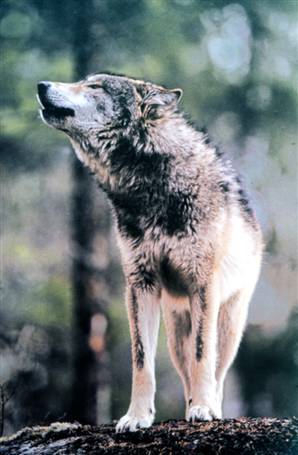Untitled Document
 |
The gray wolf could make a
comeback in the Northeast, after a judge ordered the Interior Department
to restart efforts to reintroduce the species. |
MONTPELIER, Vt. - In what environmentalists hailed as a major victory,
a federal judge on Friday ordered the Bush administration to step up efforts
to restore the gray wolf to Maine, New Hampshire, Vermont and New York.
“The wolves are howlin’” in celebration, Patrick Parenteau,
director of the environmental law clinic at Vermont Law School, said with a
laugh. Parenteau, lead attorney in the case, said his students “did all
the hard labor in the case. It's a nice victory for our students.”
Judge J. Garvan Murtha, sitting in the U.S. District Court for Vermont,
found that the Department of the Interior violated federal law in 2003 when
it issued a rule saying no further efforts to restore the wolf were needed.
Efforts to restore wolves had been successful in Minnesota, Wisconsin and Michigan's
Upper Peninsula. The government wanted to lump those states in with the Northeast
in a new, 21-state eastern region, and declare that enough had been done to
restore wolf populations throughout the eastern United States.
No lumping allowed
But Murtha wrote that the Fish and Wildlife Service “simply cannot downlist
or delist an area that it previously determined warrants an endangered listing
because it ‘lumps together' a core population with a low to nonexistent
population outside the core area.”
If the U.S. government had prevailed, Parenteau said, “the only wolves
that would exist in the eastern United States would be those wolf populations
in the upper Great Lakes. That's what the final rule (put out by the Fish and
Wildlife Service) said and that's what we challenged.”
Environmental groups, including the National Wildlife Federation, Vermont Natural
Resources Council, Maine Wolf Coalition, Environmental Advocates of New York
and Maine Audubon Society, joined in the lawsuit.
They argued that good wolf habitats exist in northern Maine and in New York's
Adirondack Mountains, and that northern Vermont and New Hampshire likely would
become an important corridor for wolves migrating between those two habitats.
John Kostyack, lawyer for the National Wildlife Federation, called the ruling
a “major victory for wolves and for all the people who care so much about
preserving America's natural heritage.”

